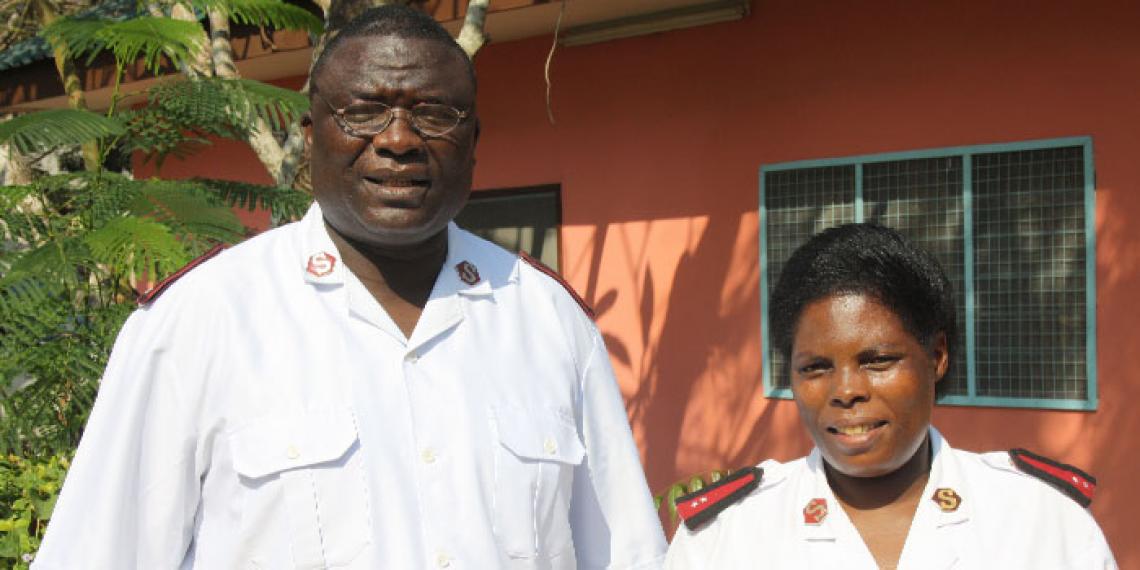You are here
A need to serve

As a young man growing up in Mbeya in the south of Tanzania, Josephat Nyerere discovered in himself a need to serve. His upbringing had instilled a deep conviction that God wanted him to change the world by transforming the lives of those living without food, without hope and without any real faith that life could be better. He responded to God by first becoming a Salvation Army corps leader and then, after two years of training, a Salvation Army officer.
Captain Nyerere is still serving. Today, he is Social Secretary for Tanzania, with responsibility for Salvation Army schools and girls homes.
Girls Homes
Kwetu is a home for girls aged 13 and up who have been rescued from life as commercial sex workers on the streets. Most of these girls came to Dar es Salaam because their family couldn’t afford food or education, or to escape arranged and often abusive marriages. At Kwetu, they receive counselling and vocational training in sewing, hotel management, nursery school teaching and more. After six months, they are resettled back in their home community.
Nearby is the Mbagala Girls Home, which offers the same service—but for girls younger than 13, often as young as seven. At this age, some girls work on the streets as beggars, with the money they collect on street corners taken back to their ‘handler’, who is either a family member or the ‘recruiter’ that took them from their family under false pretences. At night, many of these girls are forced to work in the sex trade, despite their young age.
Until The Salvation Army opened these homes in 1994, no agency was dealing with girls begging on the street or in the sex trade. Boys were being helped because they have more value in the local culture. It’s still common for bright and capable girls to be denied secondary schooling because they are valued less than their brothers.
School for children with disabilities
Matumaini School, run in Dar es Salaam by The Salvation Army, was the first school for children with disabilities in Tanzania when it opened in 1967. It is still widely regarded as the best. Disabled children are often seen as a curse in African cultures—they are hidden away and ignored. Matumaini provides close to 200 children with a home and education where they are valued and celebrated.
It is incredible to watch these bright, effervescent children—many of whom are missing limbs or disfigured in some way—entering into life with such joy. You haven’t lived until you see kids with no feet or legs playing soccer or volleyball! Yet, when they are sent home for holidays, the things they’ve been given at school are often taken for their siblings. Some spend their holidays shut away in their room to avoid bringing shame to their family.
There are also a number of albino children at the school. Some witch doctors in Tanzania—there are many still active, even today—have taught that albino body parts bring good luck to farmers and fishermen. Some of the children at Matumaini are only alive because of the work of people like Josephat Nyerere.
A heart to give
Josephat has an incredible heart for these kids. He knows their chance at any kind of meaningful life is in the hands of The Salvation Army—and in Tanzania, that means in the hands of overseas donors, because this territory is incredibly poor. Matumaini, Kwetu and Mbagala only stay open because of overseas donations.
Josephat knows he is also one of the lucky ones—many officers in Tanzania only receive about NZ$20–30 a month, but those working at Territorial Headquarters get closer to NZ$50–70 a month. As a result, he is a generous giver, but his heart aches to do more. To provide the girls graduating from Kwetu with materials to start their own business, for instance, rather than trying to find jobs that don’t exist in rural communities. To provide funding for secondary education for girls that have completed their six months at Mbagala. To expand Kwetu from providing accommodation to 10 girls at a time, to 36.
How deeply does Josephat care about what he does? Amina (not her real name) is a graduate of Mbagala, but when she finished her time there, Amina had no home to go to. A woman took her in, but proceeded to treat her as a domestic slave, so Amina returned to The Salvation Army, where she has stayed for close to 10 years now. Amina can no longer stay at Mbagala, so until there is an opening for her to live with the matron at Kwetu, she is living with Josephat and his wife Sisita, along with their four children.
The reason Josephat serves—the reason he believes in the spiritual principle of ‘self denial’ —is that he sees the purpose of his life as helping children who have no hope to live in a changed and sustainable way, and to see them come to faith. One of his proudest memories is of a girl with no legs who moved from Matumaini to secondary school and then university. Today, she is a productive and committed Christian.
The gift you give this year when you give to the Self Denial Appeal will literally save lives, thanks to the dedication of people like Josephat Nyerere.
By Josephat Nyerere (abridged from War Cry, 27 July 2013, p7)
- For more info and links to videos of Salvation Army work overseas, visit our Self Denial Appeal page.